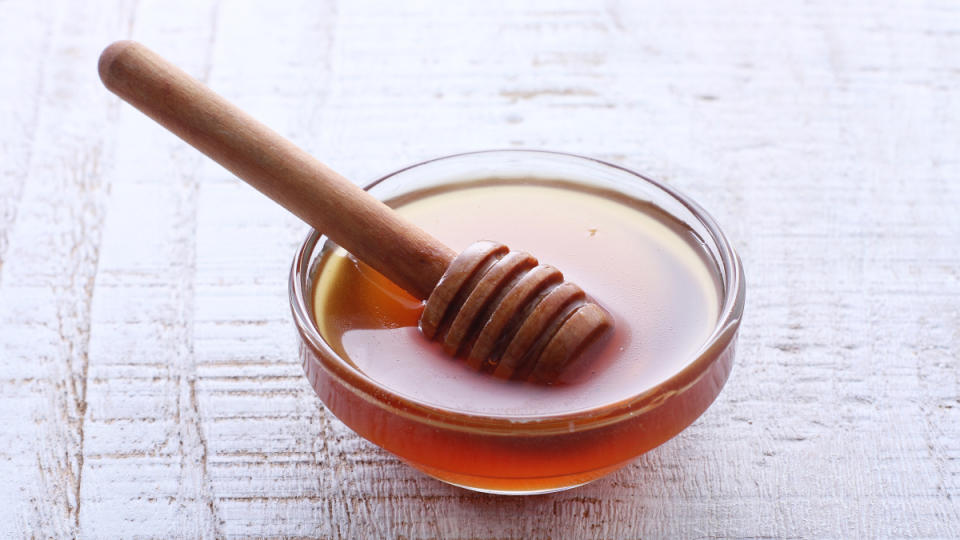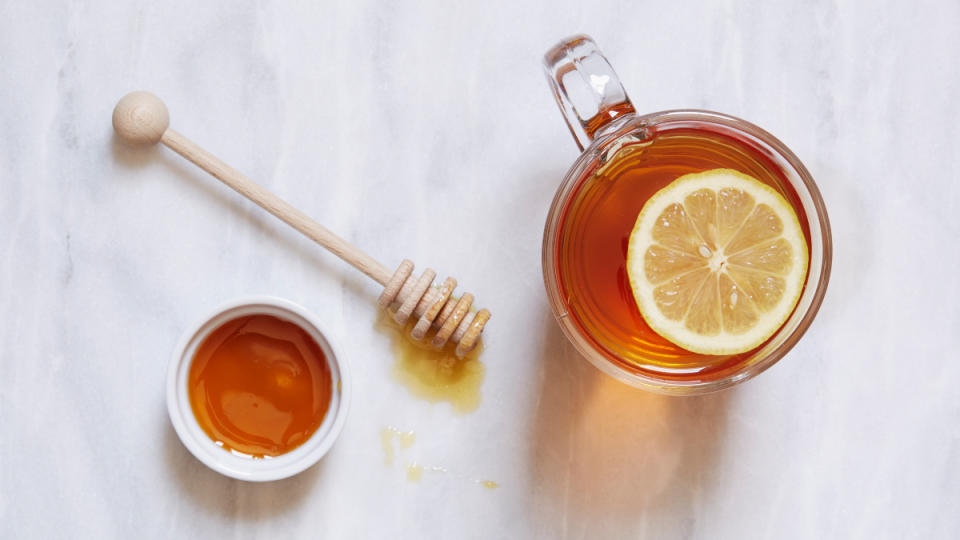Skip the Cough Suppressants — Pairing Honey With *This* Kitchen Staple Offers More Effective Relief
Got a cough you can’t seem to shake? Lemon and honey for cough relief may be just the natural remedy you need. And if you’re not a fan of syrupy cough suppressants, the subtly sweet-and-tart flavor combo will be a relief for your taste buds, too.
Believe it or not, coughing can actually be good for you. According to the American Lung Association, the occasional cough is a natural reflex that helps to protect your airway against irritants like germs, mucus and dust. And it’s an effective line of defense — the average cough travels up to 50 miles per hour and expels up to 3,000 droplets. Gross, but efficient.
Of course, that doesn’t make it any less frustrating when you’re stuck with a cough that just won’t quit. A lingering cough from a viral respiratory infection or bad bout of allergies can leave your throat raw and your muscles achy. Coughing can also interfere with your sleep, making it difficult to get the rest your body needs to recover.
The good news: Sipping lemon and honey can soothe your throat and help you get rid of that cough. Here’s what you need to know, including the best type of honey to use and when to take it to maximize the benefits.
What causes a cough?
Viral infections, including the common cold, are among the most common reasons for a cough. While upper respiratory infections usually clear up within 10 days, the accompanying cough may linger for up to eight weeks.
Allergies, asthma and postnasal drip can also cause coughing. And people with lung conditions like emphysema and chronic obstructive pulmonary disease (COPD) may experience a persistent cough as a symptom.
Even when you’re not dealing with respiratory issues, you may find yourself coughing if something irritates your airways. “Coughing can be triggered by changes in temperature, such as going outside into cold air,” says Linda Yancey, MD, a board-certified infectious disease specialist at Memorial Hermann Hospital. “Particulates in the air like cigarette smoke, pollen and dust can also cause coughing. Some people with acid reflux will develop a chronic cough.” (If your cough is triggered by reflux, click through for our best fast-acting heartburn relief remedies.)

A cough is considered chronic if it sticks around for more than eight weeks. “It's important to seek medical attention if your cough is severe or persistent, as it could be a sign of an underlying health issue,” advises Raj Dasgupta, MD, Chief Medical Advisor at Sleep Advisor and a board-certified physician.
Why cough medicine may not be your best bet
File this under things we wish we knew before gulping down all that grape-flavored syrup as a kid: Cough medicine may not be the most effective way to treat a cough after all.
According to the American Chemical Society, there's little evidence that cough syrup is effective at treating coughs. In fact, research suggests it's often no better than a placebo. And a review of 29 research trials found no good evidence for or against the effectiveness of over-the-counter meds when it comes to calming an acute cough.
Fortunately, combining lemon and honey for a cough can provide potent, natural relief that works.
Does honey help a cough?
Honey is a tried-and-true natural remedy for relieving a cough. “Some studies suggest that honey might offer relief from coughing due to its potential soothing and anti-inflammatory properties,” Dr. Dasgupta says. “The thick consistency of honey may help to coat the throat, potentially reducing the urge to cough and providing relief for a sore throat.” (If your cough is accompanied by a raw, scratchy throat, click through to see which tea is best for a sore throat.)
In fact, research suggests honey might be a better treatment option than certain OTC cough medicines. A Penn State University study suggests folks with an upper respiratory infection who took a single dose of buckwheat honey 30 minutes before bed reported more effective symptom relief and better sleep than those given honey-flavored dextromethorphan (the cough suppressant in meds like Robitussin DM, Theraflu Cold and Cough and Sudafed PE Cold/Cough).
Better yet, the study authors said that while dextromethorphan can cause unpleasant side effects like drowsiness or dizziness, honey delivers its cough-calming benefits without the risk of adverse effects.

Honey for a cough is such a sweet remedy that the National Institute for Health and Care Excellence (NICE) in the U.K. now recommends it as a first-line treatment for patients with an upper respiratory infection or acute bronchitis. According to NICE guidelines, unless a patient is seriously unwell or at high risk for complications, doctors should recommend honey for cough relief before more intense treatments (such as antibiotics).
The best type of honey for a cough
So what type of honey is best for a cough? Research suggests Manuka honey — a type of honey produced by bees that pollinate the flowers of the Manuka bush in New Zealand — offers antiviral benefits. That may be especially helpful when recovering from influenza. And Dr. Dasgupta recommends looking for raw, natural honey that doesn’t contain added sugar or additives. One to try: New Zealand Honey Co. Raw Manuka Honey (Buy from Amazon, $38.88).
While Manuka or raw honey are most beneficial, any type of honey will help soothe a scratchy throat and calm your cough, Dr. Yancey says. So choose whatever brand and varietal you like best — or simply whatever you have on hand when a cough strikes.
Related: Spicy Honey Is the Sweet-Hot Cure for Coughs, Congestion + Sore Throat, Say MDs
Combining lemon and honey for cough relief
While honey is a stellar cough remedy on its own, combining it with lemon amps up its effects. The duo delivers a one-two punch for your cough: Honey coats and soothes your throat, and lemon gives your immune system a much-needed boost.
“Lemons are rich in vitamin C, which helps to support the immune system and fight off infections that might be causing a cough,” Dr. Dasgupta says. “Combining lemon with honey could help ease inflammation, soothe the throat and lessen the urge to cough for some." That's thanks in part to lemon's powerful antioxidant and anti-inflammatory properties. (Click through to discover the health benefits of lemon water.)
Lemon and honey also work together to combat mucus that often comes with a cough. “There’s a suggestion that honey may limit mucus production, thereby reducing the likelihood of triggering the cough reflex,” says Thomas Holland, MD, MS, a physician scientist and faculty member at RUSH University System for Health. “Lemon has the potential to initiate the breakdown of mucus, facilitating its loosening and easier expulsion from the body.”
There’s one more benefit to lemon and honey for cough that can’t be overlooked: They taste better together! “Lemon honey tea is a classic home remedy for the common cold,” Dr. Yancey says. “A spoonful of straight honey works well, but does not taste nearly as good."
How to combine lemon and honey for a cough
Ready to reap the benefits of lemon and honey for a cough? Dr. Dasgupta suggests mixing 1 Tbs. of honey and 1 Tbs. of freshly-squeezed lemon juice into a cup of hot water or tea. Let it cool slightly before drinking.
Wondering which tea is best for a cough? “I prefer to enhance the experience with green teas featuring mint, adding a more robust flavor,” Dr. Holland suggests. “The tea itself contains flavanols, serving as antioxidants and anti-inflammatories, with links to various health benefits.” One to try: Bigelow Green Tea with Mint (Buy from Amazon, $19.46).

The best time to take lemon and honey for a cough
Lemon and honey can relieve a cough at any time of day. But you might get the most bang for you buck if you take it before bed. Why? When you’re lying down, you’re more likely to experience postnasal drip and mucus entering the airway. This can trigger a linger cough (or even a coughing fit) that saps your sleep. So generally, the most beneficial time to sip this concoction is right before bedtime, Dr. Holland adds.
Who should avoid taking lemon and honey for a cough
While the natural duo is top way to calm coughs, honey isn’t the right remedy for everyone. Babies under the age of one should not be given honey due to the risk of infant botulism, a type of food poisoning caused by a bacteria that can sometimes be found in honey. (This type of bacteria isn’t harmful to older kids or adults.) And a tablespoon of honey contains around 17 grams of sugar, so those who are diabetic should be mindful of their sugar consumption when taking honey for a cough.
Tip: If lemon and honey isn’t helping your cough, talk to your doctor about other treatment options. “Keep in mind that everyone's experience may differ,” Dr. Dasgupta says. “If a cough persists, it's a good idea to speak with your doctor for the most effective solution.”
For more ways to soothe a stubborn cough:
Spicy Honey Is the Sweet-Hot Cure for Coughs, Congestion + Sore Throat, Say MDs
This content is not a substitute for professional medical advice or diagnosis. Always consult your physician before pursuing any treatment plan.
First For Women aims to feature only the best products and services. We update when possible, but deals expire and prices can change. If you buy something via one of our links, we may earn a commission. Questions? Reach us at [email protected]
Solve the daily Crossword

